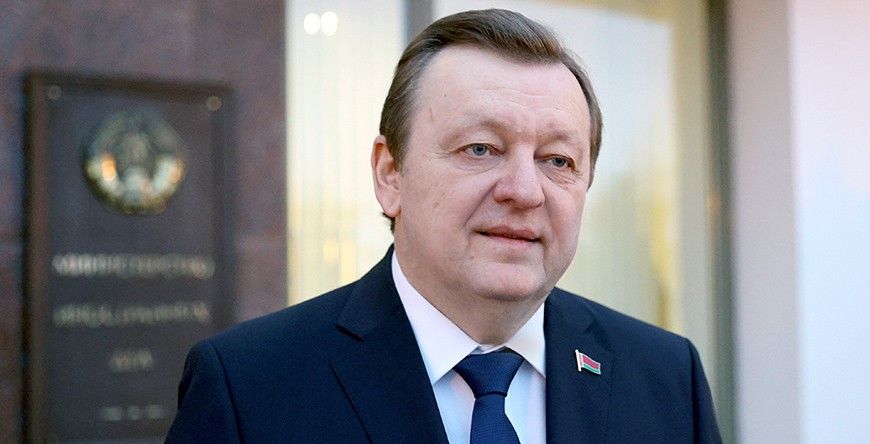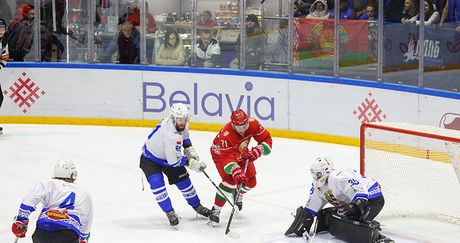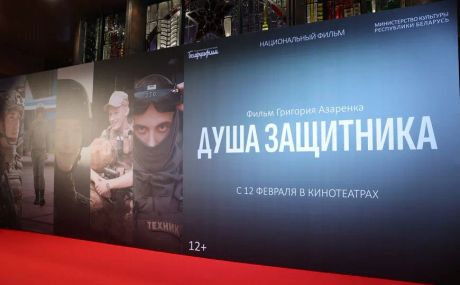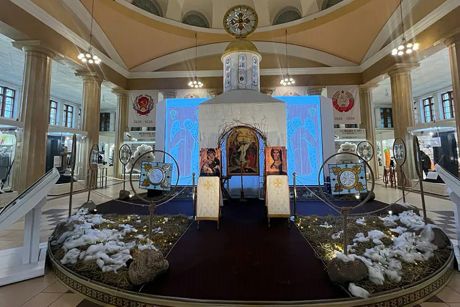Protecting historical truth named as absolute priority for Belarus, Russia
11:00, 5 June

Photo: BelTA
The West's efforts to impose a fake picture of the world makes the task of protecting historical truth an absolute priority, Belarusian Minister of Foreign Affairs Sergei Aleinik said in his greetings to the first Russian-Belarusian forum of historians held in Moscow, BelTA learned from the press service of the Belarusian Embassy in Russia.
- Share on Facebook
- Share on VK
- Share on Twitter
The message of greetings from the Belarusian minister of foreign affairs was read out by Pavel Legky, Minister Counsellor at the Belarusian Embassy in Russia, at the plenary session of the forum on 3 June
"Fate decreed that the current generations of Belarusians and Russians have to fully experience the well-known saying about the complexity of living in an era of change. The consequences of the global geopolitical catastrophe of the late 20th century - the collapse of the Soviet Union - have not yet lost their acuteness and are fresh in our memory, and we are once again at the cusp of history. These colossal events are not only redrawing borders and changing the world order, but are also leading to a shift in the paradigm in historical science, changing the worldview and value system of entire nations. These are not always progressive changes. But, I am sure, true values and historical truth have a sufficient margin of safety to withstand the epochal changes. After all, power, as we know, is in truth. Unfortunately, today humanity lives in the era of post-truth - a global trend created by sophisticated minds to control the minds of the masses and assert the hegemony of Western civilization. The blatant distortions of our history that we are witnessing today, the facts of manipulating people and imposing a frankly fake picture of the world on them have made the task of preserving and protecting the historical truth one of our absolute priorities," the Belarusian minister of foreign affairs said.
According to him, Belarusian and Russian historians face another, important and urgent task - to study the so-called gray zones of our common history and reach an objective understanding and a unified interpretation of the essence and significance of historical processes. "This is a delicate work, coupled with active search, discussions, rethinking. But we need it for the Union State to increase its internal stability," the minister said.
"The third task, which is more of a practical nature, facing not only historians, is the effective use of historical knowledge both in the preparation of the most important management decisions, strategies and concepts for the development of states and in the daily work of all branches of government. Historical wisdom is given to us so that we apply it worthily in practice," Sergei Aleinik noted.
The fourth task of historians is education, he said. "We have no right to forget or ignore the lessons of history. But the paradox lies in the fact that people, undoubtedly agreeing with the idea of its cyclical nature, massively being carried away by this branch of knowledge, stubbornly consider the current time as a completely new process that has no historical analogies. But life is based on previous experience in the same way as science is based on previously accumulated knowledge. Therefore, the fourth, most important task of historians is education, enlightening. Educating, persuading is your mission. Its scale is difficult to measure, and it has been relevant for centuries," the minister said.
The forum was held in Moscow on 2-3 June to discuss topical issues affecting various aspects of the study of the historical memory of the peoples of Belarus and Russia, the formation of the common scientific and educational space and the prospects for further scientific and educational integration of the two countries.
On behalf of Belarus, the event was attended by researchers from the Institute of History of the National Academy of Sciences, professors and executives of the Academy of Public Administration under the aegis of the President of the Republic of Belarus, the Belarusian-Russian University, the Belarusian State University, the Yanka Kupala State University of Grodno, Kuleshov Mogilev State University, Polotsk State University, Francysk Skaryna Gomel State University, and Masherov Vitebsk State University.
The speakers were Sergey Naryshkin, Chairman of the Russian Historical Society, Valery Falkov, Minister of Science and Higher Education of the Russian Federation, and Dmitry Mezentsev, State Secretary of the Union State. The forum was also attended by representatives of the Institute of Russian History of the Russian Academy of Sciences, the Institute of World History of the Russian Academy of Sciences, the Russian State University for the Humanities, Lomonosov Moscow State University, researchers from academic institutes and leading universities of the Russian Federation from St. Petersburg, Smolensk, Penza, Arkhangelsk and other regions.






